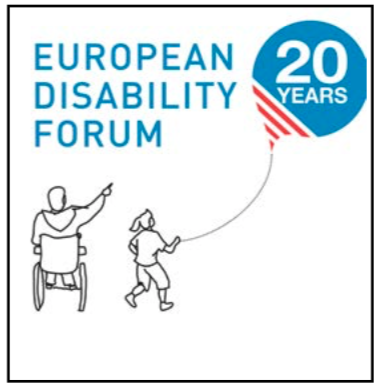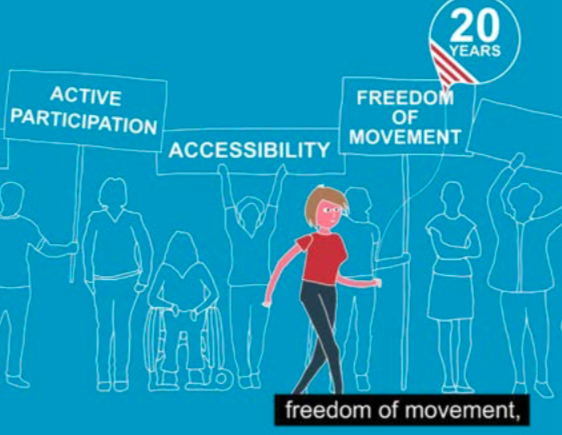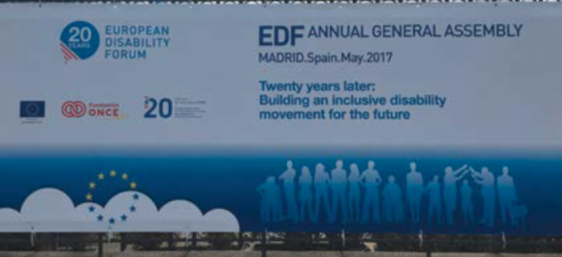In 2003, six years after the establishment of the European Disability Forum (EDF), the first European Year of Persons with Disabilities was celebrated. It was a point of arrival, but above all a beginning for new challenges and new opportunities. Apart from the ceremonies, including first the European Day of Persons with Disabilities and the European Parliament of Persons with Disabilities, that year was important because the organizations that represented these people, largely excluded from society, were themselves not always aware of their rights. They were nearing the fulfilment of their greatest aspiration: to be involved and to actively participate in the design and implementation of a European program that would give new strength to their national claims.

In the past, the management of European programs was in the hands of the Commission, the government of the Union, and decisions often came from above after the fact. Founded in 1997 by the organizations of persons with disabilities and their families (an interesting change that brought close to the movement those persons with disabilities unable to represent themselves), the EDF had worked hard to reach that date with clear ideas on what to ask and how to reach for it. In that year was adopted the European Action Plan 2003-2010 on Equal Opportunities for People with Disabilities, the first of its kind, which set long-term goals and procedures.
At that time the European Union was in a phase of political and economic growth, despite the early signs on the horizon of some critical issues arising and weighing heavily with the advent of the economic crisis of 2008. In reality, the European system was not yet able to accept disability as a fundamental part of the mechanism. The results were not exciting, especially because of the gap between the relatively progressive approach of the European institutions and the unwillingness of Member States, reluctant to take on commitments that were, above all, economic in nature. In 2010 the impact of the crisis was already felt, and the issue of disability was not included among the key issues of the Europe 2020 strategy, which, furthermore, failed miserably. Instead of bowing out, the Forum launched a proposal for a new strategy for the next decade. The proposal was accepted and the new European Disability Strategy 2010-2020, a new commitment for a Europe without barriers, opened new perspectives for dialogue and challenges. Meanwhile, in 2006, the United Nations General Assembly adopted the United Nations Convention on the Rights of Persons with Disabilities (the Convention) and, together with us, the Commission was ready to make of this first international treaty ratified by the EU itself in 2010 an innovative element of its social policy. The strategy moves along three priority areas: fundamental rights, inclusive growth and social equity, according to which no one can be left behind.

The new ten-year disability strategy focuses on eight priority areas: Accessibility, Participation, Equality, Employment, Education and Training, Social Protection, Health, and External Action. The ratification of the Convention has certainly consolidated at the institutional level the transition from the traditional approach to disability (mainly medical or functional) towards the new social model, based on an objective, scientific and neutral evaluation, but not binding on the effects of support measures for inclusion and social protection, which refer to the political and economic climate of reference. The economic crisis also weighed heavily on the choices, even if not all states reacted with reductive measures. The objectives of the strategy are still valid, and the Commission intends to pursue them using at best the skills and tools at its disposal to raise awareness of the issues, collecting meaningful data and statistics and giving concrete support to representative organizations.
However, the highest priority remains the need to integrate disability issues in all areas where the EU has competence. Another particularly significant element is that in 2015 the EU, having ratified the Convention, was examined by the UN Committee on the Rights of Persons with Disabilities, which analyzes the reports that States Parties must present after ratification to demonstrate what they did to implement the convention in their country. The EU is the only regional organization that ratified the Convention and therefore had to prepare its report and then champion it before the committee. According to EU references, the committee has prepared a series of recommendations for the future, the so-called "Concluding Observations." In February 2017, the Commission published its mid-term report on the implementation of the strategy. Analyzing the report considering the results, the EDF made some critical remarks for each of the eight areas of interest.

ACCESSIBILITY
This is the area that has seen the most work, as accessibility is the basic requirement for social inclusion and participation. The positive results achieved were the adoption of a directive on the accessibility of the websites of public bodies and their related applications. The approval by the European Parliament of a Commission proposal on the accessibility of products, goods and services (built environment, electronics, banking services, transport, communication tools and services, etc.), even if within limits that are too narrow; the presentation by the Commission of a new directive on audiovisual media. However, the EDF has recognized the need for a definition of accessibility that is valid for all possible situations and for all possible users. Member States must adopt national legislation and harmonize it in the interest of both users and companies. The text of the European Accessibility Act passed by Parliament last September is very reductive even against that of the Commission. The application of the website accessibility directive must be constantly monitored.
PARTICIPATION
Consultation and active collaboration of organizations representing persons with disabilities have been taken seriously by the Commission which organizes every year, with the collaboration of the EDF, the European Day of Persons with Disabilities and the Work Forum responsible for implementing and monitoring the United Nations Convention on the Rights of Persons with Disabilities. Representative organizations have positively welcomed the project of a European Disability Card, but pointed out that the project has not met expectations. In fact, it concerned only a limited number of states, each one of which interpreted it in its own way, creating much confusion. Greater coordination is needed as well as the participation of all Member States. Furthermore, the implementation of this program probably requires a clear legal basis for the definition of disability to be used for issuing the card.
EQUALITY
Equality and non-discrimination are at the centre of the strategy. Member states must unblock the proposal for a directive against discrimination, on hold since 2008, which will now have to be revisited in the light of the Convention.
EDUCATION AND TRAINING
Access to the labour market is a very sensitive issue, as no progress has been made for years relating to the employment of persons with disabilities. And the issue of reasonable accommodation measures has not been resolved. As a matter of fact, it is still thought that it is the person with disability who must adjust to their working conditions, while the principle of reasonable accommodation measures requires that working conditions be as much as possible accommodated to the needs and abilities of the disabled worker. It is also important that welfare benefits not constitute a disincentive to employment. Disabled women and people with intellectual or psychosocial disabilities are the most disadvantaged. Even professional training is very poor.
EDUCATION
Inclusive education still faces significant obstacles, also because the EU has no direct competence in this area. In many Member States, it is still preferred to educate persons with disabilities in specialized educational institutions, as it is considered complicated and expensive to include them in mainstream schools.
SOCIAL PROTECTION
The security and social assistance systems in the EU states differ greatly. The new program of the European Commission to establish the fundamental principles of social security programs, the "European Pillar of Social Rights," does not particularly focus on the problems of disability, limiting itself to suggesting very general measures. In fact, the competence in this area is mainly that of Member States.
HEALTH
Unfortunately, at the national level, there are still significant shortcomings in the accessibility of medical facilities and services by persons with disabilities. In addition, there continues to be numerous reports of violations of the right to freedom to make decisions regarding informed consent, treatment and hospital interventions. For individuals with intellectual disabilities decisions are still too often made by guardians or even judges, especially regarding sexual and reproductive issues.
EXTERNAL RELATIONS
It is important for the EU to integrate disability in the context of its initiatives to promote sustainable development in the spirit of the Convention. Humanitarian actions must be accessible and inclusive. In this sense, the collaboration of representative organizations is essential. In conclusion, in the second phase of the strategy, it is necessary to further strengthen the awareness that all persons with disabilities have the same rights and in particular their inalienable dignity as people, equal treatment and full participation in society. Women, children, disabled elderly people, as well as those in need of more important support or with invisible disabilities face additional barriers and multiple forms of discrimination that must be known and eliminated. In this sense, the Disability Strategy must result in concrete and measurable results. The European Forum is already looking forward to the new 2020-2030 strategy and the European Year of Persons with Disabilities in 2021 when the 10th anniversary of the entry into force of the Convention is celebrated.





.png)